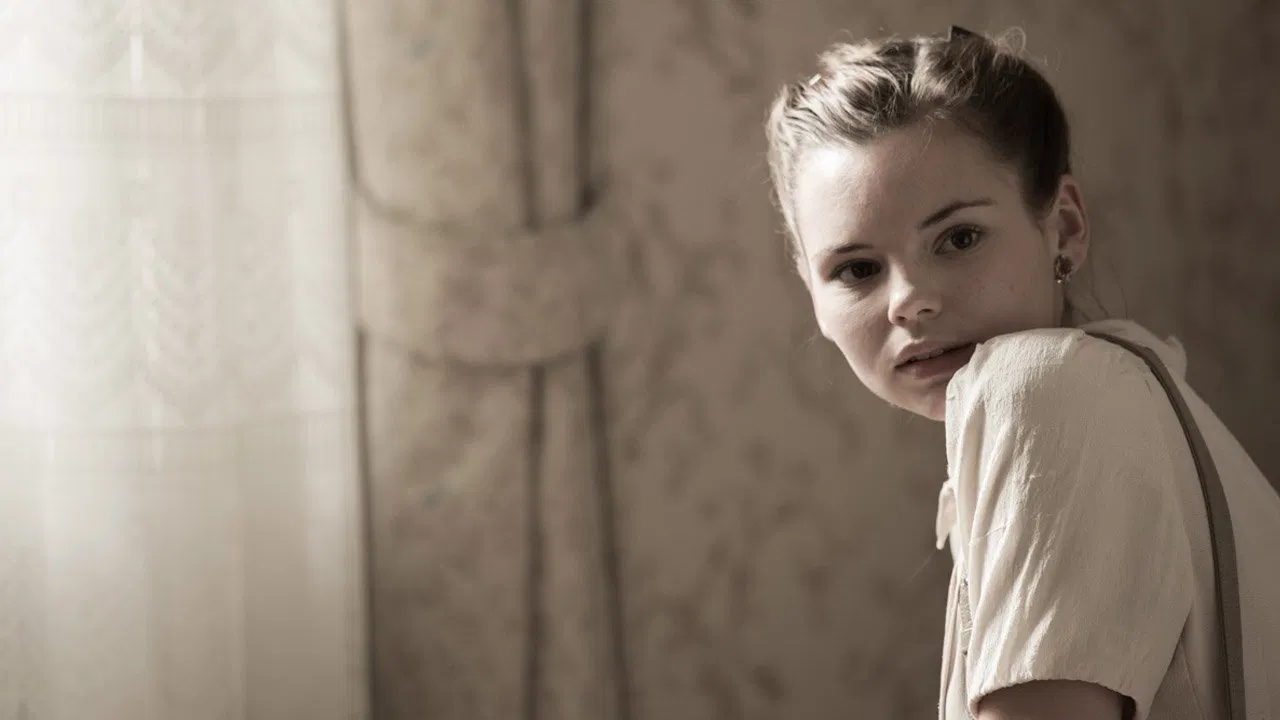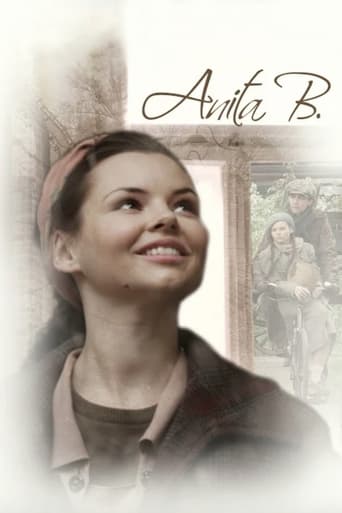

Let's be realistic.
... View MoreThe first must-see film of the year.
... View MoreThis is a coming of age storyline that you've seen in one form or another for decades. It takes a truly unique voice to make yet another one worth watching.
... View MoreAll of these films share one commonality, that being a kind of emotional center that humanizes a cast of monsters.
... View More"Anita B" tells a tale not often told, exploring the emotional challenges of readjusting to "normal" life. The cinematography is picturesque and strangely entrancing, and gives off the impression of a moving piece of artwork. Eline Powell (Anita) is extremely convincing, honest and powerful at every turn, and tells Anita's story with remarkable drive. One of the most effective attributes of the film, however, is the likability of EVERY character. Just as in real life, there is no true villain. Each character is complex and has a point of view, leaving "Anita B" to linger in one's mind long after the viewing is over.
... View MoreAn intense and heartfelt movie, the story of Anita B immediately captures the attention of the viewer. Anita B is the story of a young girl who has just been rescued from the horrors of Auschwitz by the Red Cross. The movie opens showing a Red Cross van driving across the beautiful, but desolate and snowy mountains. Soon the complex and intriguing character Eli appears to escort Anita back to her new home. Anita's new life commences in the house of her only living relative: her aunt, Monika. Having lost both her parents in Auschwitz, Anita struggles to honor her aunt's request to avoid mentioning the horrors she witnessed. We even learn that Anita was loath to leave Auschwitz as her parents had not survived. Anita does not want to forget her parents and thus confides in little baby Roby about her past. The cinematography was beautiful and the story realistic. Through Anita, Eli and Monika, one comes to understand how much the Holocaust affected people's lives. Anita has a clear case of survivor's guilt, but wants to face the past. Eli and Monika are both frustrated with Anita's inability to forget. Both don't want to remember the horrible circumstances in which their loved ones died. In this way, this film shows us how much the past can influence who we are. Because of their experiences, Monika and Eli have turned into somewhat cold and selfish people. Yet this film also shows that they are not inherently like that, but rather are only trying to protect themselves from their own memories. They don't want to show how they really feel. Instead they have built a wall around them and are only trying to ensure their own survival. Monika's husband acts as the middle ground and tries to keep the peace. The romance between Anita and Eli is not simple. Learning later that Eli has his own dark past, the viewer begins to have compassion for him. At times he is kind and protects Anita, but all too often he dismisses Anita's pleas for him to stop his advances. At times he appears to be the heartless villain. At first afraid of Eli, Anita grows to love him and believes he feels the same about her. In the end Anita realizes what she wants and chooses to leave him. The development of Anita is especially captivating. At first a small, weak, lost girl, Anita transforms into a strong young woman, who takes hold of her future. She confronts those who try to stand in her way and demands respect. Despite her troubling past, in the end, Anita is able to move on. The only baggage she has is the future.
... View MoreIn the film, Anita is taken to live with her Aunt Monica and her family in Czechoslovakia where she spends her days trapped inside taking care of their son Robbie and telling him of her time in Auschwitz because no one else will listen. She soon falls in love with Eli and becomes pregnant, but when he pressures her to abort the child, she escapes to Jerusalem to start a new life for herself.The beauty of Anita B. derives from the remarkable detail brought to a simple and truthful storyline through incredible acting. Though most of the film simply shows Anita working through her daily routine, her emotions are worn for everyone to see and make her an extremely sympathetic character. Powell beautifully portrays the innocence of a young woman confused by her station in life and longing for some affection and security. Her superb acting is accompanied by that of Sheehan, who plays Eli. Throughout the story, it is difficult to make a decision about his character. At times he is lovable and sweet to Anita and in others he is so vile that it is impossible to understand how she could love him. One of the most heart wrenching moments in the film is when he tells Anita that the last thing he wants is to bring a child into that world. This complex moment truly shows the three dimensionality of his character. The death of his fiancée has destroyed his faith in the world and he cannot fathom knowingly bringing a child into the harsh society in which he is forced to live. The film is also incredibly well written and executed cinematically. The story clearly demonstrates that everyone at that time was effected by the Holocaust in some way or another and that there was no good way to deal with the aftermath of all that pain. Anita takes comfort in describing her experiences to Robbie as a sort of therapy, but Monica plagued with the guilt of a survivor, refuses to acknowledge that anything had even happened. She copes by blocking out the past instead of remembering and learning from it. Then there is David, Anita's confidante who follows the path of many young Jewish people at the time and decides to escape the death of his parents by going to Jerusalem, and of course Eli who has taken to pessimism and women in order to numb the pain of it all. Each character is faced with the challenge of trying to move on and the difficulty of that task is executed masterfully throughout the film. The film also transports the viewer into this time period through cinematic choices made to give it the look of a much older film. The sepia quality used not only ages the movie, but also creates an essence of darkness and despair that suits the time period.
... View MoreAnita B. is a film based on the true story Quanta stella c'è nel cielo by Edith Bruck about a young Holocaust survivor's life just following the end of World War II. The protagonist, Anita, goes to live with her Aunt Monika, Monika's husband, Aron, their son, and Aron's brother, Eli, after she is freed from Auschwitz. She is quickly thrust into a passionate love affair with Eli, which quickly turns unpredictable, unreliable, and unhealthy. Once she gets her papers, she is desperate to find and make connections with the people in her life- coworkers, family, neighbors. She slowly begins realizing that Eli is not the man with whom she fell in love, and must make difficult and life-changing decisions. Anita is constantly faced with adversity in almost every arena of her life, and emerges with strength and optimism toward her future in this story of survival and triumph.Anita B. is a gorgeous, thought-provoking, intense, and truly extraordinary film. It embodies many of the difficulties faced by Holocaust survivors after World War II, a theme not many films have addressed. The cinematography, costuming, and scenery were all beautiful, making the film an absolute treat to watch. The acting, particularly of Eline Powell (Anita) and Robert Sheehan (Eli), was convincing, honest, and carefully thought-out. The characters were extremely complex, and the character of Eli specifically stood out to me as intriguing and multi-faceted. The film portrays Eli in all of his varying states and constantly presents him as a complex character. Sheehan was cast perfectly as Eli, and was able to embody everything that the character represented in the film. From the beginning, he is portrayed as funny, sweet, and caring. He charms both Anita and the audience, but the pain he carries deep within him slowly starts to show, subtly at first and then more obviously as the film progresses. You fall in love with him as Anita does, and then you start questioning his integrity when you see how he sometimes treats her, until you realize what he's going through and how he suppresses his agonizing emotions. You then begin feeling sorry for him because neither you nor Anita can fully blame him for his actions; as she says to him toward the end of the film, "it's not your fault, it's just the way you are." In this sense especially, the film encourages us to identify with Anita and allows us to feel what she feels in any given moment. Eli could easily have been made out to be the "villain" of the story, but we are shown that he is extremely complex and might not be as bad of a guy as one may think. I love that the story does not have a true villain, and that it focuses on Anita and her journey to find a home and herself in this new world of hers. The film leaves you feeling optimistic and proud of Anita for finally being truly freed.
... View More